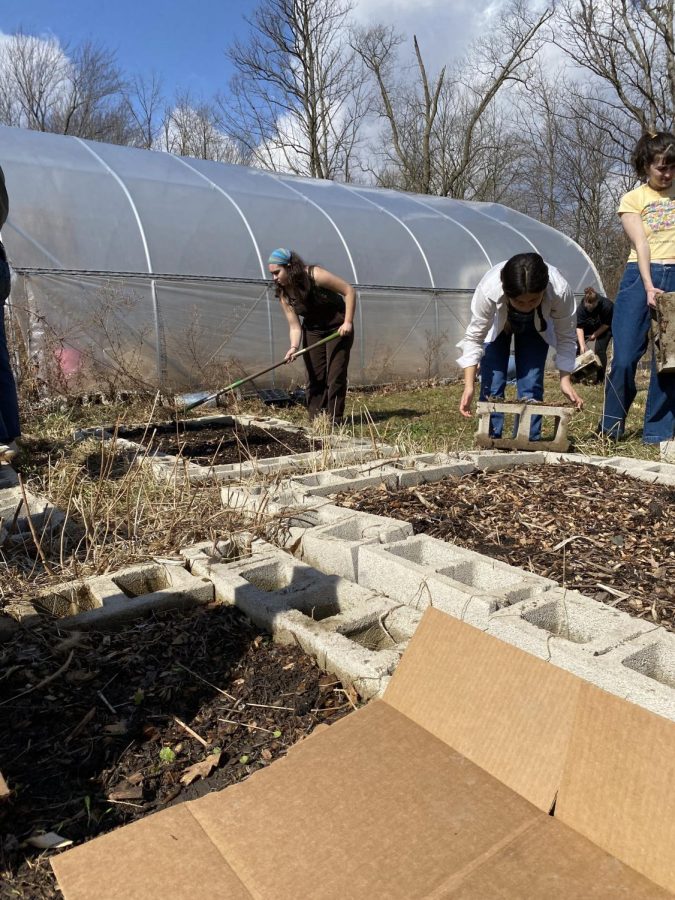General Faculty Approves New Food Studies Integrative Concentration
Students work at the Johnson House garden.
The General Faculty voted unanimously for the College to officially offer Food Studies as an integrative concentration this Wednesday. Food Studies examines the role of food in culture, economics, and environmental issues.
“It’s an interdisciplinary field,” Associate Professor of English and Comparative American Studies Danielle Skeehan, who plans to teach the first Intro to Food Studies course in fall 2023, said. “It uses methods from the humanities and humanistic social sciences to study food from a variety of cultural, historical, environmental, [and] sociopolitical angles.”
Oberlin has long offered food studies courses across the disciplines, but they were not formally connected. College second-year Elijah Freiman is designing his own Food Studies major and described the food-related classes offered as disparate.
“There’s only one department that I’m taking more than one class in,” Freiman said. “[My credits] come from English, … from biology, from geosciences, from anthropology, [and] sociology.”
Chair of Sociology Greggor Mattson offers classes that will be incorporated into the concentration. His classes center the role dining and drinking establishments play in culture, particularly the role of gay bars in LGBTQ+ culture. He is currently teaching a StudiOC course with Associate Professor of French and Cinema Studies Grace An in which the pair discuss food through their respective academic disciplines.
“I’m bringing my sociological approach to place and labor and she is bringing a humanist approach to savoring and aesthetics and how do we make a meaningful life,” Mattson said.
The new integrative concentration incorporates existing Food Studies classes and also adds new classes.
The General Faculty designed the Food Studies concentration plan to incorporate community involvement with academic learning.
“All the integrative concentrations include a required experiential learning component, and for food studies, we are particularly focused on collaborating with community organizations, and that can take a lot of different forms.” Jay Fiskio, professor of Environmental Science and Comparative American Studies, said. “So students may be working with global organizations, they may do internships, they may take a community-engaged course, or they may be doing research for different community organizations or food justice groups.”
Within Food Studies courses, professors often incorporate experiential learning.
“[An] and I were not interested in bringing academics [to the class],” Mattson said. “We were interested in entrepreneurs and people who were using their liberal arts background to make a life in the hospitality industry.”
Mattson and An brought Black River Café owner Joe Waltzer, OC ’98, in to speak to the class. The class is also set to go on field trips to a cheese factory, a winery, among other locations.
Skeehan hopes that as the integrated concentration grows, relationships with community businesses and organizations will be strengthened.
“[Community involvement] is not the same thing as just inviting someone in to speak,” Skeehan said. “It’s more about establishing long-term relationships that are mutually beneficial. … The idea is to build relationships with community partners that actually allow Oberlin and Oberlin students and faculty to contribute in positive ways to their communities.”
While separate from Oberlin College’s new intensive concentration, Oberlin’s Food Studies partnership with Lorain County Community College also provides an opportunity for students to get involved in food justice issues. Oberlin recently received a $1 million grant from the Mellon Foundation to expand the partnership, which aims to give students from both institutions the opportunity to learn about and get involved in addressing food justice issues in the community. The partnership works with local food justice organizations.
“Oberlin Community Services is definitely one of the main partners on the grant,” Fiskio said. “We’ve already begun talking with Frank Whitfield, who’s the mayor of the city of Elyria, to see how we can do food justice work in collaboration with the City. … In the longer term, I think there are two things we really want to focus on: sustainable and ethical partnerships here in Lorain County.”
Skeehan, Fiskio, and other faculty planning the Food Studies concentration hope that it will give students knowledge that can be applied to real-world scenarios in their community.
“Social justice is built into the idea of food studies. You can’t do food studies without thinking about inequality and how food also structures ideas about race and gender and ethnicity and class.” Skeehan said.







